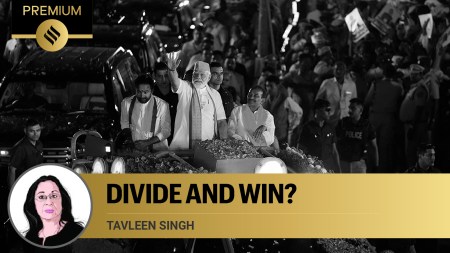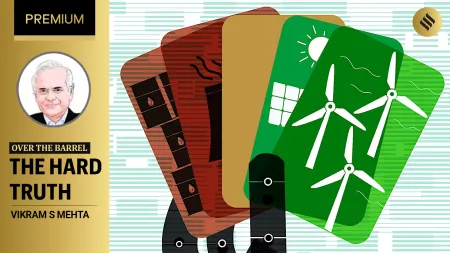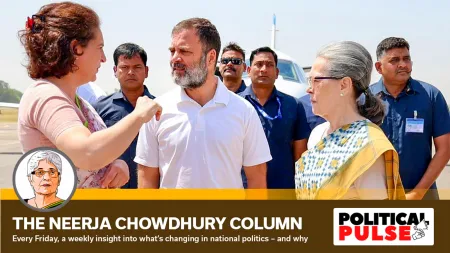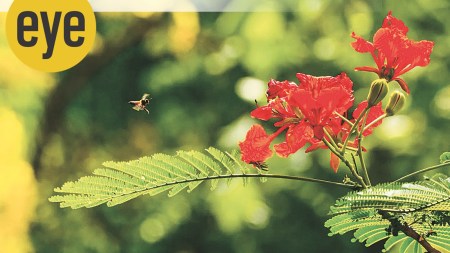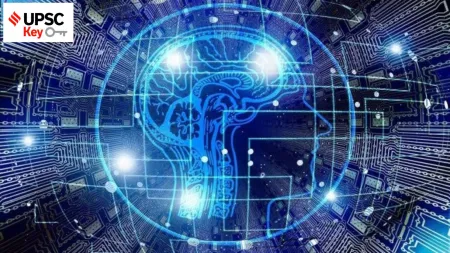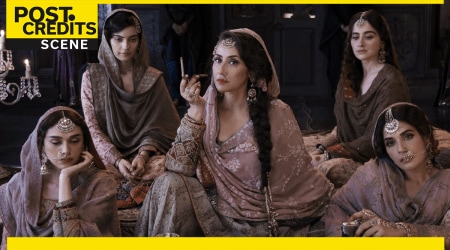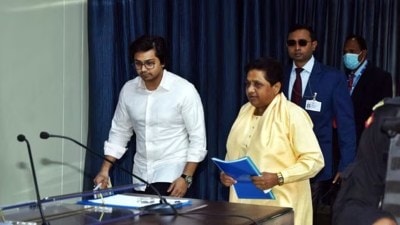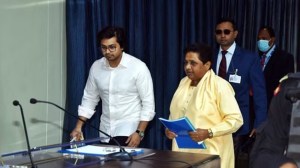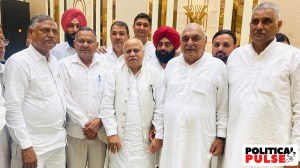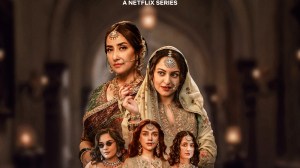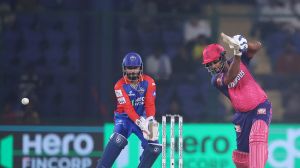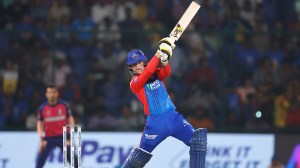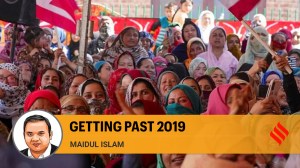- India
- International
Explained: Who was Harichand Thakur and what is the importance of Matua community?
Who was Harichand Thakur? Why has BJP been wooing the Matua community?
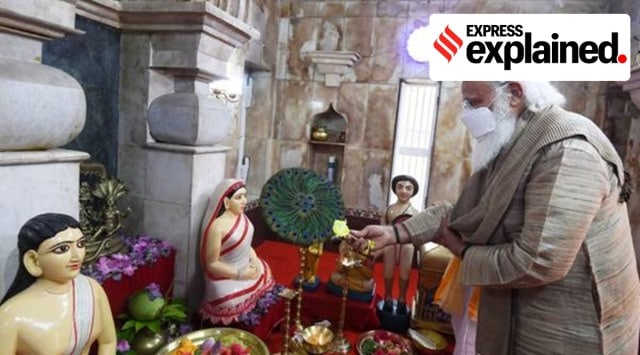 Prime Minister Narendra Modi at the Hari Mandir in Orakandi (Press Information Bureau, file)
Prime Minister Narendra Modi at the Hari Mandir in Orakandi (Press Information Bureau, file)Prime Minister Narendra Modi on Tuesday virtually addressed the Matua community during the opening of ‘Matua Dharma Maha Mela 2022’. The Mela, being organised by All India Matua Mahasangha at Shreedham Thakurnagar in West Bengal’s North 24 Parganas district on the occasion of the 211th birth anniversary of Shree Shree Harichand Thakur, will end on April 5.
“The teachings of Sri Sri Harichand Thakur become more important when we witness violence because of self-interest, and attempts to divide society on the basis of language and region,” PM Modi said.
Delighted to address Matua Dharma Maha Mela 2022 on the Jayanti of Sri Sri Harichand Thakur Ji. https://t.co/UrxHjlMh8L
— Narendra Modi (@narendramodi) March 29, 2022
The prime minister also called upon the Matua community to raise awareness to remove corruption at every level in society. “Today, I would also like to request all the members of the Matua society. To eradicate corruption from the system, we all have to further increase society’s awareness. If anyone is being harassed anywhere, then definitely raise your voice there. It is our duty towards the society as well as towards the nation,” he said.
🗞️ Subscribe Now: Get Express Premium to access the best Election reporting and analysis 🗞️
Who was Harichand Thakur?
Harichand Thakur was born in 1812 in Orakandi in Bangladesh in a peasant farmer family of the Thakur community (SC community). Thakur, whose family were Vaishnavite Hindus, founded a sect of Vaishnavite Hinduism called Matua. This was adopted by members of the Namasudra community, who were then also known by the common pejorative name of Chandalas and considered untouchable.
The sect, opposed to caste oppression, later attracted adherents from other communities marginalised by the upper castes, including Malis and Telis. Thakur’s followers consider him God (hence called him Thakur) and an avatar of Vishnu or Krishna. Thus, he came to be known as Sri Sri Harichand Thakur. 

Married to ‘Jagat Mata’ Shanti Mata, with whom he had two sons, Thakur died in Faridpur district in Bangladesh in 1878. After his death, one of his sons, Guruchand Thakur (born in 1846), collaborated with English Baptist missionary doctor Cecil Silas Mead, who worked and lived among the Namasudras, to get the Chandala people recategorised as Namasudras.
Harichand Thakur devoted his life to the cause of betterment of the oppressed, downtrodden and deprived people in undivided Bengal during the pre-independence era.
Who are Matuas?
Originally from East Pakistan, the Matuas migrated to India during Partition and after the creation of Bangladesh. However, a sizable number are yet to get Indian citizenship. The BJP’s promise of Citizenship (Amendment) Act (CAA) to speed up citizenship for immigrants like them was one of the reasons the Matua voters swung behind the NDA in the 2019 Lok Sabha polls.
In November 2018, late matriarch of Matua Mahasangha, Binapani Devi Thakur was awarded Banga Bibhushan, the highest civilian award of West Bengal. Ahead of 2019 Lok Sabha polls, Prime Minister Narendra Modi met Binapani Devi Thakur who was referred to as ‘Boro Maa’ (elder mother) and took her blessings. She passed away on March 5, 2019.
Why has BJP been wooing the Matua community?
The Namasudras form one of the largest chunks of SCs in Bengal, comprising 17.4 per cent of the population, behind Rajbanshis (18.4 per cent), as per the 2001 Census data. The BJP has been aggressively wooing the Namasudras (with the Matuas its biggest group), together comprising around 1.5 crore voters, with presence in at least 42 Assembly seats spread across North 24 Parganas, Nadia and some parts of north Bengal.
In the 2019 Lok Sabha polls when it won 18 seats, the BJP led in 33 of the total 68 SC-reserved Assembly segments in the state. Out of these 33 seats, 26 are Matua-dominated. The Trinamool led in 34 segments, and the Left and Congress in only three.
In 26 Assembly seats in North 24 Parganas and Nadia districts where Matuas have a strong presence, the BJP won 14 seats in the last year’s Assembly polls while the TMC won 12. In 2019, the BJP led in all 26 Matua-dominated seats in these two districts.
Matua community and their long-standing demand for citizenship
After the BJP-led NDA government promised to implement CAA, the Matua community helped the saffron party win most of the SC constituencies in Bengal in 2019.
Getting citizenship is one of the long-standing demands of this refugee community. In a bid to get their support again, the BJP, in its manifesto for West Bengal Assembly polls last year, promised to implement CAA in the first cabinet if it is voted to power in the state.
However, in January this year, Union Minister of State for ports, shipping and waterways, Shantanu Thakur, and BJP MLAs in West Bengal who belong to the Matua community, renewed their demand for the immediate implementation of the CAA. During a meeting chaired by the Union Minister at Thakurnagar in North 24 Parganas district, headquarters of the community, the Matua community also decided to hit the streets to protest against the delay in the implementation of CAA. The meeting was attended by nearly 40 leaders of the Matua community.
Why the renewed demand for CAA?
The Citizenship Amendment Act was brought in by the BJP-led central government in 2019 to grant citizenship to religious minorities of Bangladesh, Pakistan and Afghanistan who had to flee their countries because of persecution. The Act was passed by Parliament on December 11, 2019 and the Presidential nod was received the next day. Subsequently, it was notified by the home ministry. However, the law is yet to be implemented as the rules under the CAA are yet to be framed.
Since the home ministry could not frame rules within six months of the enactment of the CAA, it sought time for the committees — first in June 2020 and then four more times. The fifth extension came to an end on January 10. Till now there has not been any clear message from the Centre on when CAA will be implemented.
Newsletter | Click to get the day’s best explainers in your inbox
More Explained
EXPRESS OPINION
May 07: Latest News
- 01
- 02
- 03
- 04
- 05




